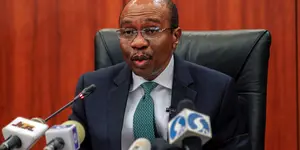Senate Initiates Measures to Prevent CBN Governor and Deputies from Engaging in Partisan Politics
The Nigerian Senate has taken a significant step to prohibit the Governor of the Central Bank of Nigeria and Deputy Governors from participating in partisan politics, aiming to strengthen the central bank's non-partisan stance and improve governance.
Senate's Move to Safeguard CBN's Non-Partisan Status

The Nigerian Senate has embarked on a significant legislative endeavor to prevent the Governor of the Central Bank of Nigeria (CBN) and Deputy Governors from engaging in partisan politics. This noteworthy development comes as two Bills, aimed at enacting this critical change, have successfully passed the second reading stage in the Senate. The Bills, jointly sponsored by Senator Sunday Karimi of Kogi West and Senator Darlington Nwaokocha of Abia Central, reflect a growing consensus on the need to insulate the leadership of the central bank from political activities.
The core premise of these legislative proposals revolves around the notion that the CBN Governor and Deputy Governors should remain non-partisan throughout their tenure, refraining from engaging in partisan politics. Additionally, the Bills advocate for the inclusion of key stakeholders on the CBN Board to ensure comprehensive oversight and effective governance. Specifically, the Auditor-General of the Federation, chairpersons of the Federal Inland Revenue Service (FIRS), and the Chartered Institute of Bankers in Nigeria (CIBN) are among the envisioned board members.

Senator Nwaokocha, who spearheaded the discussion on his proposed Bill, highlighted the compelling need for these amendments. He emphasized that such legislative changes would serve to fortify the banking system, enabling it to fulfill its primary role as a financial intermediary for investments and economic growth in Nigeria. In his eloquent presentation, Senator Nwaokocha delineated various aspects of the proposed amendments, including the separation of the head of Management from the head of the governing Board, the enhancement of governance architecture, the establishment of real-time controls, and the reinforcement of effective accountability within the operations of the CBN.
Senator Adams Oshiomhole expressed dissent during the debate, opposing the second reading of the Bill. He argued that the case of the former CBN Governor, Godwin Emefiele, was a result of governance failures and the failure to enforce existing laws.
Presiding over the session, Deputy President of the Senate, Senator Barau Jibrin, underscored the central role of central banks in regulating monetary policies. He emphasized the necessity of repositioning the CBN through legislative changes to ensure the country's economic stability. The Bills received commendation from various senators during the debate, reflecting the Senate's commitment to strengthening the governance of the CBN and safeguarding its apolitical status for the betterment of Nigeria's economic interests.
Senator Barau referred the Bills to the Senate Committee on Banking, Charging, and Other Financial Institutions for further refinement and legislative input. The committee is expected to deliver a comprehensive report to the Senate within two weeks. This legislative action signifies the Senate's dedication to fostering a more robust governance structure for the CBN and ensuring its non-partisan character, thereby enhancing the nation's economic welfare and stability.



